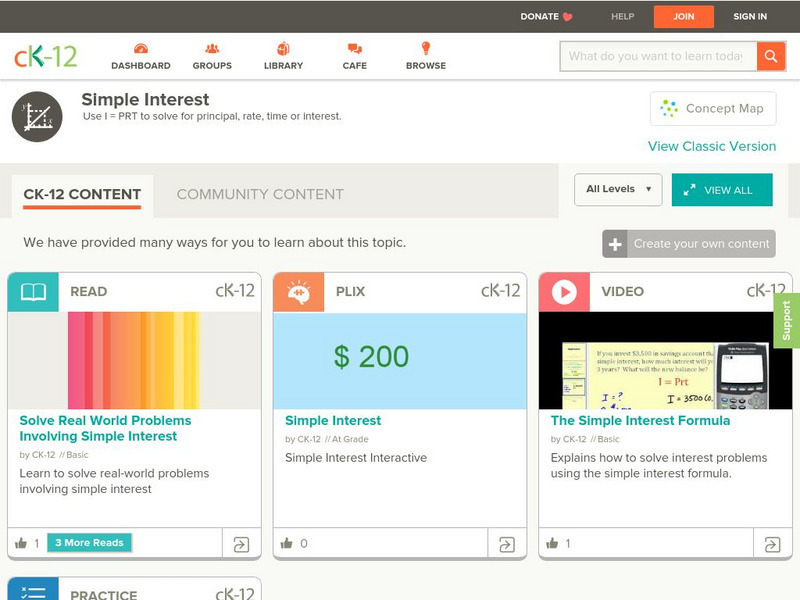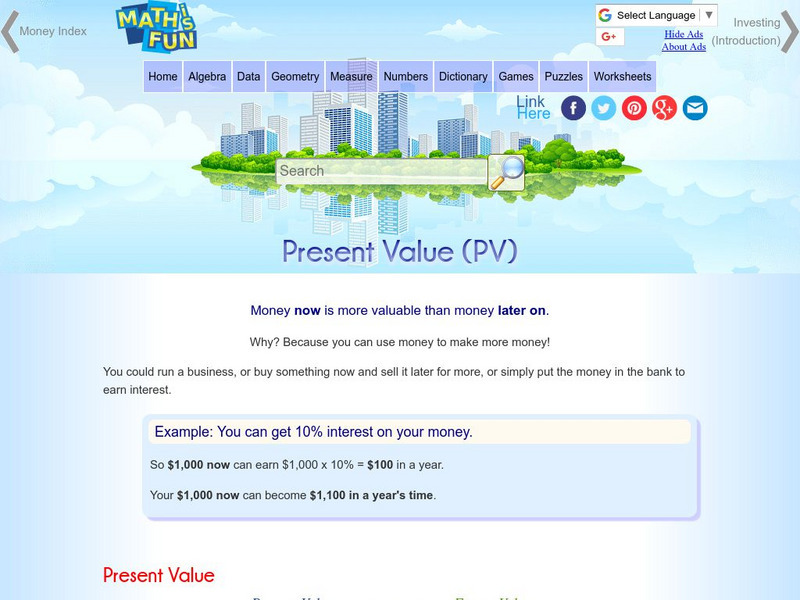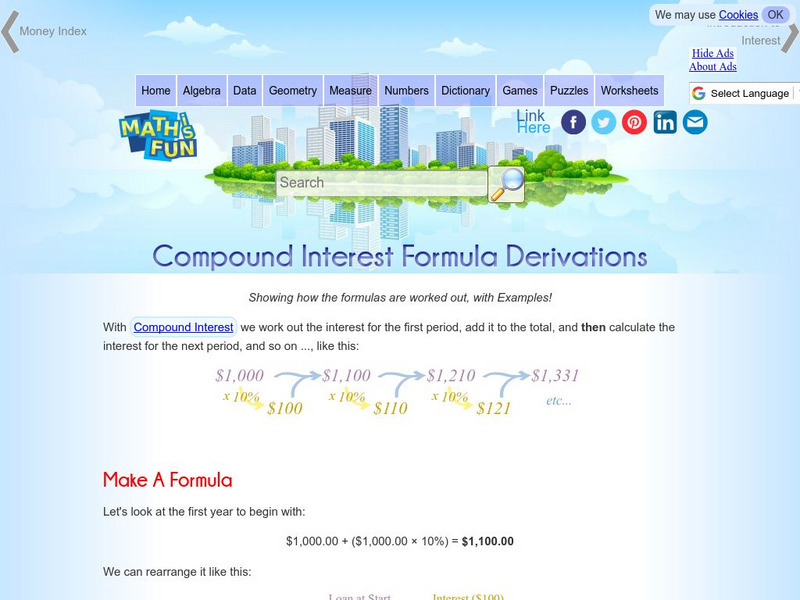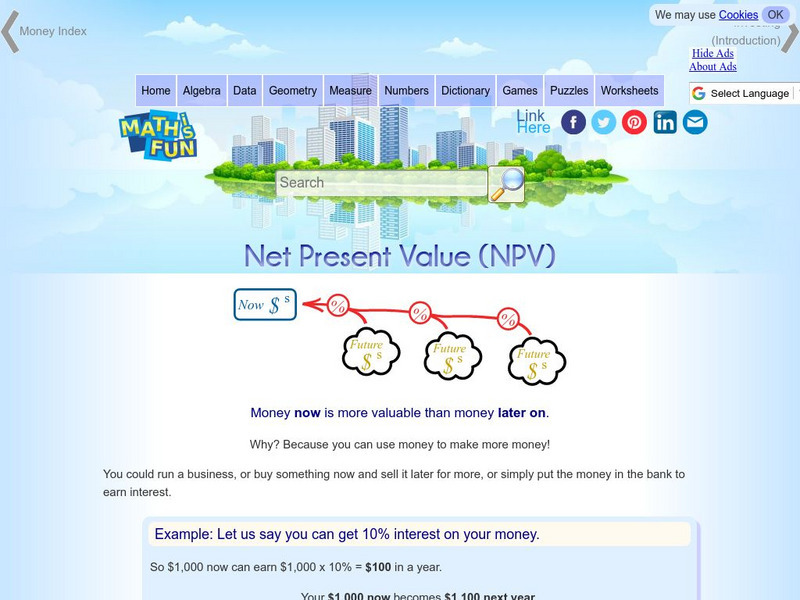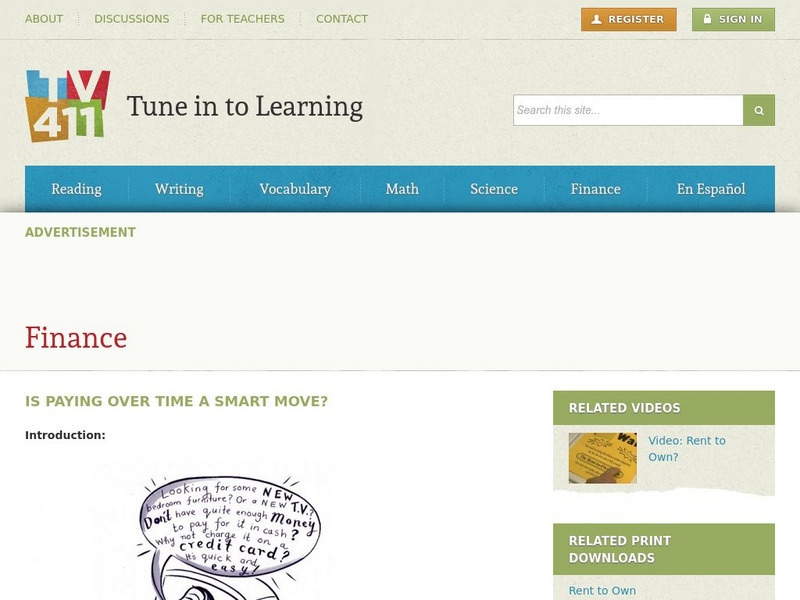Econoclass
Econoclass: Joe Wins the Lottery
This example of a person winning $1 million is examined as if he were paid the entire amount all at once, or given $100,000 over the course of 10 years. This example looks at inflation, the present value of money, and the future value of...
Discovery Education
Discovery Education: Web Math: Simple Interest Calculator
This site provides a simple interest calculator. Use it to calculate the future value of the principle and get a full explanation of the math behind the calculation.
CK-12 Foundation
Ck 12: Arithmetic: Simple Interest Equation to Find Interest Rate
[Free Registration/Login may be required to access all resource tools.] In this lesson students use the simple interest equation to find an interest rate. Students examine guided notes, review guided practice, watch instructional videos...
Math Is Fun
Math Is Fun: Present Value (Pv)
Explains how to calculate the future value of an investment based on present value, the interest earned, and the length of the investment term.
Math Is Fun
Math Is Fun: Compound Interest Formula Derivations
Looks at how the formula for calculating the effect of compound interest is derived and how it is used to create formulas for finding the Future Value, the Present Value, the Interest Rate, and the Number of Periods. Includes lots of...
Math Is Fun
Math Is Fun: Net Present Value (Npv)
Explains, with examples, what the net present value is and how to calculate it.
Math Is Fun
Math Is Fun: Internal Rate of Return (Irr)
Explains, with examples, what an internal rate of return is, its uses, and how to calculate it using the net present value.
CK-12 Foundation
Ck 12: Arithmetic: Simple Interest
[Free Registration/Login may be required to access all resource tools.] In this lesson, students find total amounts using the formula for finding simple interest. Students examine guided notes, review guided practice, watch instructional...
CK-12 Foundation
Ck 12: Arithmetic: Simple Interest
[Free Registration/Login may be required to access all resource tools.] In this lesson, students solve real-world problems involving simple interest by using problem-solving strategies. Students examine guided notes, review guided...
Education Development Center
Tune in to Learning: Is Paying Over Time a Smart Move?
At T.V. 411 you can explore the concept of paying over time with situations involving credit cards, rent to own items, and more. This interactive lesson gives the learner an opportunity to make decisions about money management.
Other
Financial Forecast Center: Prime Loan Interest Rate Forecast
See the forecast of prime loan interest rates over the next six months and read a graph showing its recent history.
Council for Economic Education
Econ Ed Link: What's My Interest?
Students explore the concept of interest by means of two activities. The first, a simple activity with jellybeans, introduces the concept of interest accruement, and the second, a practical, "real world" activity, reinforces the concept...
Council for Economic Education
Econ Ed Link: The Story of Jack and the Bank Stalk
Fairy tales have always been used to give lessons about life. The story of Jack and the Bean Stalk is a good activity about the importance of knowing about money and banks. The story of Jack asks the question, "What is money?"
Council for Economic Education
Econ Ed Link: A Penny Saved
Students will read the comic book, "A Penny Saved" published by the New York Federal Reserve Bank. Students will make the information relevant through projects, graphic organizers, teacher instruction, and problems.
Council for Economic Education
Econ Ed Link: How Is Our Economy Doing?
Students learn the meaning and measurement of six important economic indicators and use the St. Louis Federal Reserve Bank National Economic Trends website to assess the current state of the economy.
Purple Math
Purplemath: "Investment" Word Problems
Demonstrates in a systematic way how to set up and solve 'investment' word problems.
Council for Economic Education
Econ Ed Link: Calculating Simple Interest
How do banks calculate the amount of interest paid on a loan? In this lesson, students will view a Livescribe Pencast to learn how to find the dollar amount in interest that is due at maturity. This lesson uses different time periods...
Council for Economic Education
Econ Ed Link: The Costs of Credit
"Will that be cash, check, debit, or credit?" This lesson plan explores the difference between these. What is the difference? Is using credit the same as paying with cash? Or by check? Or by debit card? Some young people believe that...
Council for Economic Education
Econ Ed Link: Compound Interest Calculator
The activity investigates compound interest, principal, and interest. Students can calculate different savings over time by inputting the monthly savings, starting age, and interest rate. The learning tool includes a graph that shows the...
Council for Economic Education
Econ Ed Link: Opportunity Cost
Consumers are faced with tough choices because so many innovative and exciting products and services are available. Therefore, engraining a decision-making process that includes considering of opportunity cost is necessary to shape...
Council for Economic Education
Econ Ed Link: Should I Use Cash or Credit?
This is a instructional activity presented by EconEdLink that delivers the dilemma of cash or credit. Includes background information, a problem-solving grid, and great questions.
Council for Economic Education
Econ Ed Link: Q T Pi Fashions Learning About Credit Card Use
Credit cards are convenient, user-friendly, and at times dangerous. In this lesson, young scholars learn the joys and dangers of using credit as they help Credit, the main character in this activity, solve her credit problems.
Council for Economic Education
Econ Ed Link: Show Me the Money!
Students will investigate unforeseen costs of car loans and/or house loans. They will then evaluate the economics of decision making, the ramifications of their choices, and options available to them. Students will compute costs and...
Council for Economic Education
Econ Ed Link: Timing Is Everything
In the first part of the lesson, students examine the incentives and opportunity costs of spending and saving in a teacher directed lesson. The remainder of the lesson is an interactive website. Students work through problems that...




